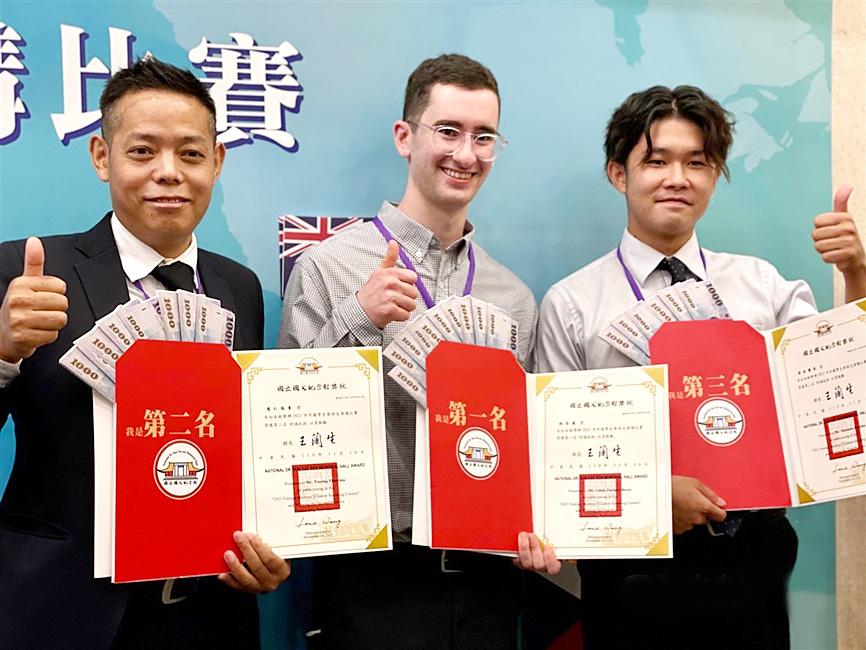A student from the US on Tuesday won the top prize in a Mandarin public speaking contest in Taipei, in which the contestants, all foreign nationals, described their experience in Taiwan or shared other personal stories.
Adam Boxer, one of the 33 contestants and an economics and Mandarin language student from Swarthmore College in Pennsylvania, won first prize for his commentary on a news article about COVID-19.
Boxer expressed his thoughts on the article, which was published in The Economist and projected how the COVID-19 pandemic might end, based on other pandemics in the past.

Photo: CNA
His presentation in fluent Mandarin earned him the first prize of NT$20,000, which he received on Tuesday.
The 21-year-old said that he arrived in Taiwan on Sept. 20, is enrolled in the International Language Chinese Program at National Taiwan University, and plans to return to the US at the end of the semester.
“I was super lucky that in my school district in Wallingford, Pennsylvania, they’d just started offering Chinese when I entered middle school,” he said. “So, I started in middle school, continued through high school, and I’m continuing in college, and I really love learning the language.”
Boxer said that learning Chinese is important to him because he loves meeting different people, and he thinks the language is an integral part of today’s world.
The 49th edition of the competition was organized by National Dr Sun Yat-sen Memorial Hall to promote Chinese-language learning and showcase the beauty of Mandarin, said Wang Lan-sheng (王蘭生), director-general of the memorial hall.
The contestants from 13 countries used powerful body language, songs and props to enliven their speeches.
Tsering Tharchin, a 35-year-old Tibetan student who won the second prize of NT$16,000, talked about what he learned during the COVID-19 pandemic.
He used a mirror to demonstrate his main point that by choosing the right angle, one can reflect optimism and kindness against all odds.
Tsering said he has been studying Mandarin at Taiwan Normal University for the past two years and three months.
Tsering said he was born in Tibet, and fled to India when he was 12.
“Since Tibet was under China’s control, when I was little, I learned a little bit of pinyin, but after I escaped to India, I totally forgot it,” he said. “When I was in college, my interest was studying China and international relations, and politics, so I felt learning Chinese was very important.”
Tsering said Taiwan has provided refuge and a great environment for him to study Mandarin.
“Taiwan is the best place, because I cannot go back to my own land, I cannot go back to China because of political reasons,” he said. “Taiwan is the only place I can stay.”
Chen Yan-hao (陳彥豪), a professor at National Taipei University’s Department of Foreign Languages and Applied Linguistics, said after the competition that many of the contestants used good vocabulary in their speeches.

Taiwanese can file complaints with the Tourism Administration to report travel agencies if their activities caused termination of a person’s citizenship, Mainland Affairs Council Minister Chiu Chui-cheng (邱垂正) said yesterday, after a podcaster highlighted a case in which a person’s citizenship was canceled for receiving a single-use Chinese passport to enter Russia. The council is aware of incidents in which people who signed up through Chinese travel agencies for tours of Russia were told they could obtain Russian visas and fast-track border clearance, Chiu told reporters on the sidelines of an event in Taipei. However, the travel agencies actually applied

Japanese footwear brand Onitsuka Tiger today issued a public apology and said it has suspended an employee amid allegations that the staff member discriminated against a Vietnamese customer at its Taipei 101 store. Posting on the social media platform Threads yesterday, a user said that an employee at the store said that “those shoes are very expensive” when her friend, who is a migrant worker from Vietnam, asked for assistance. The employee then ignored her until she asked again, to which she replied: "We don't have a size 37." The post had amassed nearly 26,000 likes and 916 comments as of this

New measures aimed at making Taiwan more attractive to foreign professionals came into effect this month, the National Development Council said yesterday. Among the changes, international students at Taiwanese universities would be able to work in Taiwan without a work permit in the two years after they graduate, explainer materials provided by the council said. In addition, foreign nationals who graduated from one of the world’s top 200 universities within the past five years can also apply for a two-year open work permit. Previously, those graduates would have needed to apply for a work permit using point-based criteria or have a Taiwanese company

The Shilin District Prosecutors’ Office yesterday indicted two Taiwanese and issued a wanted notice for Pete Liu (劉作虎), founder of Shenzhen-based smartphone manufacturer OnePlus Technology Co (萬普拉斯科技), for allegedly contravening the Act Governing Relations Between the People of the Taiwan Area and the Mainland Area (臺灣地區與大陸地區人民關係條例) by poaching 70 engineers in Taiwan. Liu allegedly traveled to Taiwan at the end of 2014 and met with a Taiwanese man surnamed Lin (林) to discuss establishing a mobile software research and development (R&D) team in Taiwan, prosecutors said. Without approval from the government, Lin, following Liu’s instructions, recruited more than 70 software